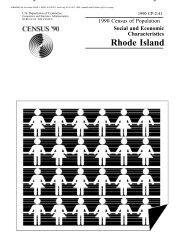Untitled - Rhode Island Historical Society
Untitled - Rhode Island Historical Society
Untitled - Rhode Island Historical Society
You also want an ePaper? Increase the reach of your titles
YUMPU automatically turns print PDFs into web optimized ePapers that Google loves.
s<br />
'.:gb: .::..<br />
Portrait of Elizabeth Buffum Chace and her<br />
oldest grandddughter, Bessie Cheney, circa<br />
1880. R/HS Collection (RHi X3 8099).<br />
Title page of a pamphlet on the Factory<br />
Inspectors Act of 1894, issued in 1909 by the<br />
<strong>Rhode</strong> <strong>Island</strong> State Federation of Women's<br />
Clubs. RIHS Collection (RHi X3 8100).<br />
108 "\7AS SHE CLOTHED \TITH THE RENTS PAID FOR THESE \(RETCHED ROOMS?"<br />
humane state insritution for orphans and homeless children; she labored to<br />
create a Board of Women Visitors to oversee stare institutions in which women<br />
lived, and she also urged the employment of female attendants in jails and<br />
police stations. A prolific correspondenr, chace published scores of letters on<br />
reform topics in the Providence newspapers, and she regularly attended meet,<br />
ings of regional organizations. At the time of her daughrer's tesrimony on behal{<br />
of the factory bill, the eighty-seven-year-old Chace rvas largelv confined to her<br />
home in valley Falls, where she continued to conduct executive meerings of the<br />
<strong>Rhode</strong> <strong>Island</strong>'woman suffrage Association and provide moral leadership to her<br />
younger comrades.'<br />
If Lillie 'wyman's presence at the Factory Inspectors Act hearing testified to her<br />
deep connection to both the <strong>Rhode</strong> <strong>Island</strong> miil town where she had come of age<br />
and the world of middle-class reform, it also bore witness to an especially fruitful<br />
mother-daughter partnership. In the years prior to the introduction of the<br />
Factory Inspectors Act, both wyman and chace had labored to bring the issue<br />
of factory women and girls to public attention. Breaking her previous silence on<br />
the issue, in the early 1880s chace had made a major sraremenr ro a narional<br />
gathering of women leaders in Buffalo, New York, urging them to pay close<br />
attention to conditions in factories and to take action to alleviate the sufferings<br />
of women workers. Throughout the decade of the 1880s 'wyman had published<br />
reaiistic fiction aimed at informing her readers about life in the mills and<br />
inciting them to action on the operatives' behalf. Both women called on their<br />
middle-class audiences and colleagues to identify with the sufferings of female<br />
factory workers across the barriers of an increasing ciass stratification in <strong>Rhode</strong><br />
<strong>Island</strong> and elsewhere.<br />
Their pathbreaking work in behalf of factory<br />
women-highly unusual for any middle-class<br />
reformer in <strong>Rhode</strong> <strong>Island</strong>, much less a motherdaughter<br />
dyad from the mill-owning class-laid<br />
the groundwork for the coalition of women lead-<br />
ers who would pressure the legislature for the<br />
passage of the Factory Inspectors Act in 1893.<br />
These efforts by Chace and \7yman have been<br />
largely forgotten; Elizabeth Buffum Chace is<br />
today remembered for her antislavery and<br />
woman suffrage labors, while Lillie Chace<br />
\7yman is almost totally unknown to modern<br />
<strong>Rhode</strong> <strong>Island</strong>ers. Yet the story of their agitation<br />
on behalf of women and children factory workers<br />
is a significant one, a story of courageous<br />
activism by two dedicated women, and it deserves a place in the history of<br />
women's reform activism in <strong>Rhode</strong> <strong>Island</strong>.o<br />
4<br />
4<br />
4<br />
4<br />
Elizabeth Buffum chace was not born into wealth. Her grandfather \filliam<br />
Buffum was a prosperous resident of smithfield, <strong>Rhode</strong> <strong>Island</strong>, but chace's own<br />
family had very little money. Her father, Arnold Buffum, was an impecunious<br />
businessman, educator, and reformer. Lillie \fyman claimed that after one of<br />
Arnold Buffum's business failures, several of his young chiidren, including<br />
Elizabeth, went to work briefly in a mill on the Blackstone River. while living<br />
4











